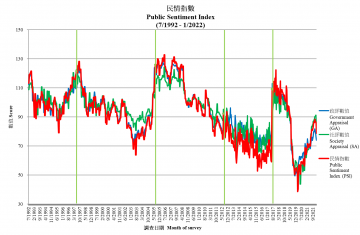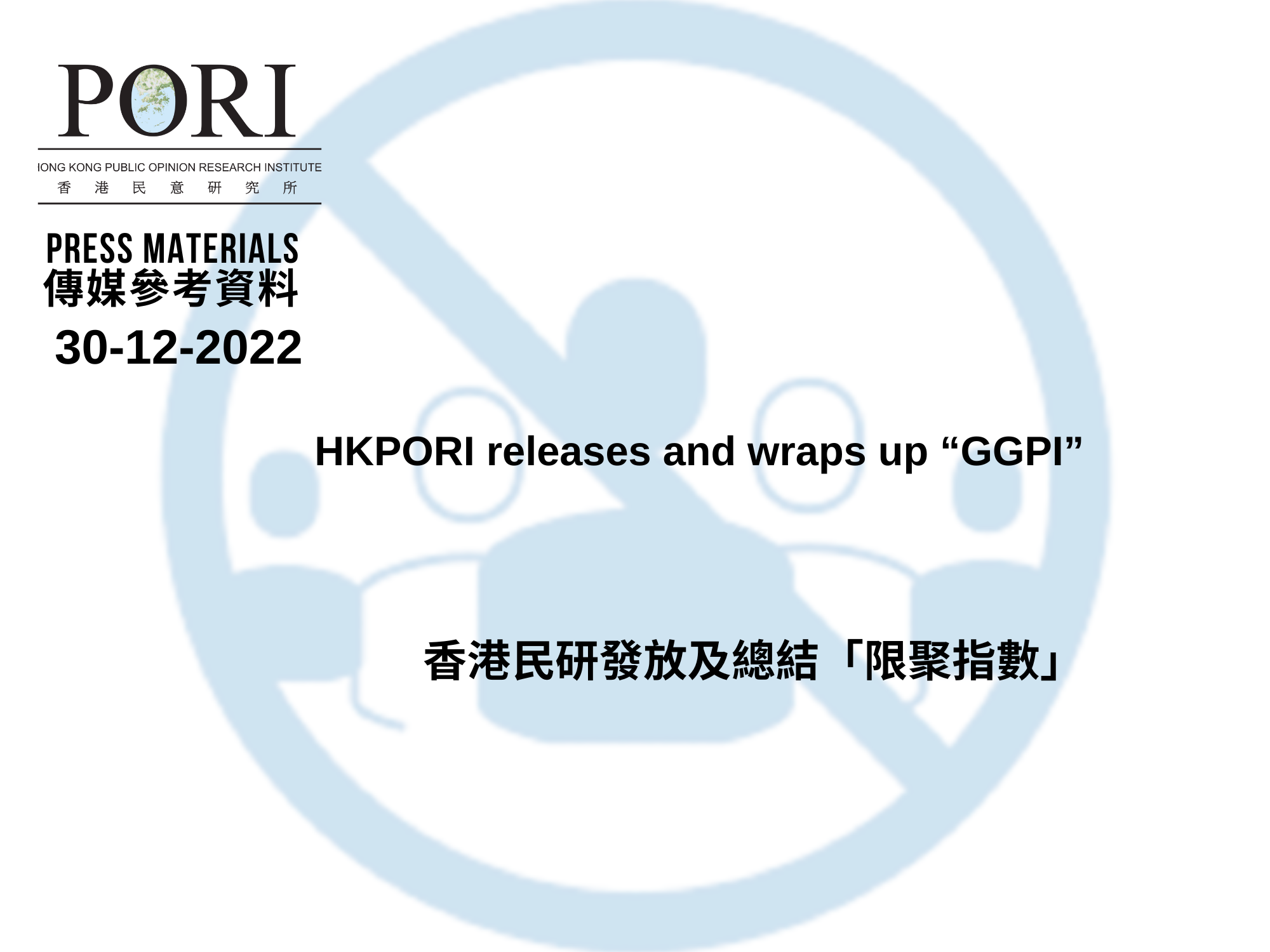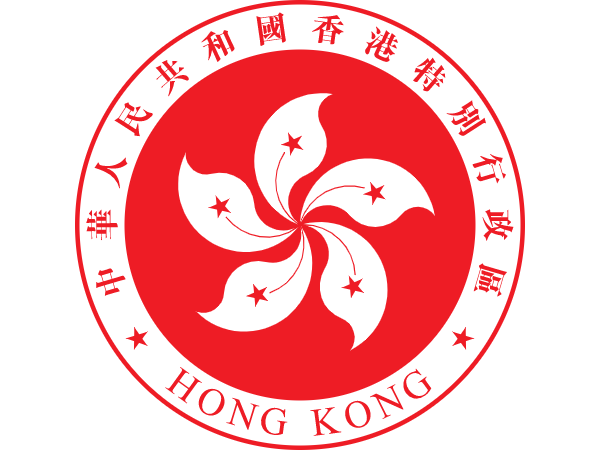Jan 25, 2022
Hong Kong Public Opinion Research Institute Press Conference – Press Materials
Speakers:
Kim-Wah Chung - Deputy CEO, HKPORI
Owan Li - Former Yau Tsim Mong District Councillor
Edward Tai - Manager (Data Science), HKPORI
Online Commentator:
KC Poon - Independent Commentator
Detailed Findings
Special Announcement
The predecessor of Hong Kong Public Opinion Program (HKPOP) was The Public Opinion Programme at The University of Hong Kong (HKUPOP). “POP” in this release can refer to HKPOP or its predecessor HKUPOP.
Abstract
POP successfully interviewed 1,021 and 1,001 Hong Kong residents in a two-stage random telephone survey conducted by real interviewers in January. Our survey shows that the latest net satisfaction of the HKSAR Government stands at negative 39 percentage points, which has dropped by 8 percentage points from a month ago, yet within sampling error, while the net trust value stands at negative 13 percentage points, which has not changed much from a month ago. As for people’s satisfaction with the current political, livelihood and economic conditions, the net satisfaction rates are negative 29, negative 37 and negative 45 percentage points respectively. The net satisfaction rates of livelihood and economic conditions have dropped significantly compared to a month ago, where the drop registered for the latter was as much as 21 percentage points. As for the PSI, the latest figure is 78.7, down by 7.2 points from early January. Meanwhile, in terms of net affinity, Hong Kong people feel more positively about all other peoples than their governments. Among them, the net affinity for the governments of Hong Kong and the United States registered negative values. Compared to half a year ago, the net affinity of Hong Kong people towards different peoples and governments have not changed significantly. Looking back at past records, the net affinity of Hong Kong people towards the people and government of Mainland China are at historical highs since 2008 and 2010 respectively, while that towards the government of Australia, the people of France, the government of France and the people of Japan are at historical lows since 2000, 2011, 2012 and 2016 respectively. The effective response rates of the surveys are 52.7% and 48.4% respectively. The maximum sampling error of percentages is +/-4%, that of net values not more than +/-7% and that of ratings not more than +/-0.1 at 95% confidence level.
Contact Information
| Survey on most familiar countries or regions (nomination) | Other survey series | ||
| Date of survey | : | 3-6/1/2022 | 17-20/1/2022 |
| Sample size[1] | : | 1,021 (including 510 landline and 511 mobile samples) | 1,001 (including 494 landline and 507 mobile samples) |
| Effective response rate | : | 52.7% | 48.4% |
| Survey method | : | Random telephone survey conducted by real interviewers | |
| Target population | : | Cantonese-speaking Hong Kong residents aged 18 or above | |
| Sampling error[2] | : | Sampling error of percentages not more than +/-4%, that of net values not more than +/-7% and that of ratings not more than +/-0.1 at 95% conf. level | |
| Weighting method | : | Rim-weighted according to figures provided by the Census and Statistics Department. The gender-age distribution of the Hong Kong population came from “Mid-year population for 2020”, while the educational attainment (highest level attended) distribution and economic activity status distribution came from “Women and Men in Hong Kong - Key Statistics (2020 Edition)”. | |
[1] This figure is the total sample size of the survey. Some questions may only involve a subsample, the size of which can be found in the tables below.
[2] All error figures in this release are calculated at 95% confidence level. “95% confidence level” means that if we were to repeat a certain survey 100 times with different random samples, we would expect 95 times having the population parameter within the respective error margins calculated. Because of sampling errors, when quoting percentages, journalists should refrain from reporting decimal places, whereas one decimal place can be used when quoting rating figures.
Popularity of SAR Government
Recent popularity figures of the HKSAR Government are summarized as follows:
| Date of survey | 20-26/8/21 | 16-23/9/21 | 18-22/10/21 | 15-18/11/21 | 9-14/12/21 | 17-20/1/22 | Latest change |
| Sample size | 651-662 | 666-703 | 598-622 | 655-677 | 589-616 | 561-602 | -- |
| Response rate | 52.9% | 44.1% | 52.2% | 53.7% | 58.0% | 48.4% | -- |
| Latest findings | Finding | Finding | Finding | Finding | Finding | Finding & error | -- |
| Satisfaction rate of SARG performance[3] | 21% | 25% | 26% | 26% | 25% | 20+/-3% | -5% |
| Dissatisfaction rate of SARG performance[3] | 59% | 54% | 55% | 56% | 56% | 60+/-4% | +4% |
| Net satisfaction rate | -38% | -30% | -29% | -30% | -31% | -39+/-7% | -8% |
| Mean value[3] | 2.3 | 2.4 | 2.4 | 2.4 | 2.4 | 2.2+/-0.1 | -0.1 |
| Trust in HKSAR Government[3] | 34% | 35% | 38% | 42% | 39% | 36+/-4% | -3% |
| Distrust in HKSAR Government[3] | 50% | 48% | 44% | 44% | 50%[4] | 49+/-4% | -1% |
| Net trust | -16% | -13% | -6% | -2% | -11% | -13+/-7% | -1% |
| Mean value[3] | 2.6 | 2.6 | 2.7 | 2.8 | 2.7 | 2.6+/-0.1 | -0.1 |
[3] Collapsed from a 5-point scale. The mean value is calculated by quantifying all individual responses into 1, 2, 3, 4, 5 marks according to their degree of positive level, where 1 is the lowest and 5 the highest, and then calculate the sample mean.
[4] The difference between the figure and the result from the previous survey has gone beyond the sampling error at 95% confidence level, meaning that the change is statistically significant prima facie. However, whether the difference is statistically significant is not the same as whether they are practically useful or meaningful, and different weighting methods could have been applied in different surveys.
People’s recent appraisals of society’s conditions are summarized as follows:
| Date of survey | 20-26/8/21 | 16-23/9/21 | 18-22/10/21 | 15-18/11/21 | 9-14/12/21 | 17-20/1/22 | Latest change |
| Sample size | 1,003 | 1,036 | 1,000 | 1,004 | 1,017 | 1,001 | -- |
| Response rate | 52.9% | 44.1% | 52.2% | 53.7% | 58.0% | 48.4% | -- |
| Latest findings | Finding | Finding | Finding | Finding | Finding | Finding & error | -- |
| Current political condition: Satisfaction rate[5] |
24% | 28%[6] | 25% | 29% | 27% | 24+/-3% | -3% |
| Current political condition: Dissatisfaction rate[5] |
58% | 54% | 53% | 52% | 53% | 53+/-3% | -1% |
| Net satisfaction rate | -34% | -25%[6] | -28% | -23% | -27% | -29+/-5% | -2% |
| Mean value[5] | 2.3 | 2.4[6] | 2.4 | 2.4 | 2.4 | 2.4+/-0.1 | -- |
| Current livelihood condition: Satisfaction rate[5] |
20% | 23% | 25% | 27% | 24% | 21+/-3% | -3% |
| Current livelihood condition: Dissatisfaction rate[5] |
54% | 52% | 52% | 55% | 52% | 57+/-3% | +5%[6] |
| Net satisfaction rate | -34% | -29% | -27% | -28% | -28% | -37+/-5% | -9%[6] |
| Mean value[5] | 2.4 | 2.5 | 2.4 | 2.5 | 2.5 | 2.4+/-0.1 | -0.1[6] |
| Current economic condition: Satisfaction rate[5] |
23% | 21% | 25%[6] | 27% | 23%[6] | 17+/-2% | -6%[6] |
| Current economic condition: Dissatisfaction rate[5] |
51% | 53% | 51% | 51% | 47% | 61+/-3% | +14%[6] |
| Net satisfaction rate | -28% | -32% | -26% | -24% | -24% | -45+/-5% | -21%[6] |
| Mean value[5] | 2.5 | 2.4 | 2.5 | 2.6 | 2.6 | 2.3+/-0.1 | -0.3[6] |
[5] Collapsed from a 5-point scale. The mean value is calculated by quantifying all individual responses into 1, 2, 3, 4, 5 marks according to their degree of positive level, where 1 is the lowest and 5 the highest, and then calculate the sample mean.
[6] The difference between the figure and the result from the previous survey has gone beyond the sampling error at 95% confidence level, meaning that the change is statistically significant prima facie. However, whether the difference is statistically significant is not the same as whether they are practically useful or meaningful, and different weighting methods could have been applied in different surveys.
Our latest survey shows that the latest satisfaction rate of the HKSAR Government is 20%, whereas dissatisfaction rate stands at 60%, thus the net satisfaction is negative 39 percentage points, which has dropped by 8 percentage points from a month ago, yet within sampling error. The mean score is 2.2, meaning close to “quite dissatisfied” in general. Regarding people’s trust in the HKSAR Government, 36% of the respondents expressed trust, 49% expressed distrust, thus the net trust value is negative 13 percentage points, which has not changed much from a month ago. The mean score is 2.6, meaning between “quite distrust” and “half-half” in general.
As for people’s satisfaction with the current political, livelihood and economic conditions, the latest satisfaction rates are 24%, 21% and 17% respectively, while the net satisfaction rates are negative 29, negative 37 and negative 45 percentage points respectively. The mean scores fall between 2.3 and 2.4, meaning between “quite dissatisfied” and “half-half” in general. The net satisfaction rates of livelihood and economic conditions have dropped significantly compared to a month ago, where the drop registered for the latter was as much as 21 percentage points.
Public Sentiment Index
The Public Sentiment Index (PSI) compiled by POP aims at quantifying Hong Kong people’s sentiments, in order to explain and predict the likelihood of collective behaviour. PSI comprises 2 components: one being Government Appraisal (GA) Score and the other being Society Appraisal (SA) Score. GA refers to people’s appraisal of society’s governance while SA refers to people’s appraisal of the social environment. Both GA and SA scores are compiled from a respective of 4 and 6 opinion survey figures. All PSI, GA and SA scores range between 0 to 200, with 100 meaning normal.
The chart of PSI, GA and SA are shown below:
 |
|||
| Latest figure | Public Sentiment Index (PSI): 78.7 (-7.2) |
Government Appraisal (GA): 74.0 (-2.4) |
Society Appraisal (SA): 80.7 (-10.5) |
Recent values of PSI, GA, SA and 10 fundamental figures are tabulated as follows:
| Cut-off date | 3/11/21 | 18/11/21 | 3/12/21 | 14/12/21 | 6/1/22 | 20/1/22 | Latest change |
| Public Sentiment Index (PSI) | 86.1 | 88.4 | 87.1 | 86.8 | 85.9 | 78.7 | -7.2 |
| Government Appraisal (GA) | 79.8 | 81.8 | 79.5 | 78.0 | 76.4 | 74.0 | -2.4 |
| Rating of CE | 35.7 | 37.4 | 34.6 | 35.8 | 33.8 | 33.8[7] | -- |
| Net approval rate of CE | -42% | -36% | -45% | -42% | -48% | -48%[7] | -- |
| Mean value of people’s satisfaction with SARG | 2.4[7] | 2.4 | 2.4[7] | 2.4 | 2.4[7] | 2.2 | -0.1 |
| Mean value of people’s trust in SARG | 2.7[7] | 2.8 | 2.8[7] | 2.7 | 2.7[7] | 2.6 | -0.1 |
| Society Appraisal (SA) | 88.1[7] | 90.2 | 90.2[7] | 91.2 | 91.2[7] | 80.7 | -10.5 |
| People’s satisfaction with political condition | 2.4[7] | 2.4 | 2.4[7] | 2.4 | 2.4[7] | 2.4 | -- |
| Weighting index of political condition | 0.31[7] | 0.31[7] | 0.31[7] | 0.31 | 0.31[7] | 0.31[7] | -- |
| People’s satisfaction with economic condition | 2.5[7] | 2.6 | 2.6[7] | 2.6 | 2.6[7] | 2.3 | -0.3 |
| Weighting index of economic condition | 0.34[7] | 0.34[7] | 0.34[7] | 0.34 | 0.34[7] | 0.34[7] | -- |
| People’s satisfaction with livelihood condition | 2.4[7] | 2.5 | 2.5[7] | 2.5 | 2.5[7] | 2.4 | -0.1 |
| Weighting index of livelihood condition | 0.35[7] | 0.35[7] | 0.35[7] | 0.35 | 0.35[7] | 0.35[7] | -- |
[7] POP will adopt the latest published figures when there are no respective updates.
As for the meaning of the score values, please refer to the following:
| Score value | Percentile | Score value | Percentile |
| 140-200 | Highest 1% | 0-60 | Lowest 1% |
| 125 | Highest 5% | 75 | Lowest 5% |
| 120 | Highest 10% | 80 | Lowest 10% |
| 110 | Highest 25% | 90 | Lowest 25% |
| 100 being normal level, meaning half above half below | |||
The latest PSI stands at 78.7, down by 7.2 points from early January. It can be considered as among the worst 8% across the past 20 years or so. Among the two component scores of PSI, the Government Appraisal (GA) Score that reflects people’s appraisal of society’s governance decreases by 2.4 points to 74.0, whereas the Society Appraisal (SA) Score that reflects people’s appraisal of the social environment decreases by 10.5 points to 80.7. They can be considered as among the worst 4% and 10% across the past 20 years or so respectively.
Feelings towards Different Peoples and Governments
In the naming survey, respondents could name, unprompted, up to 10 governments of countries or regions that they knew best apart from Hong Kong, Mainland China, Taiwan and Macau. The top 5 nominees then entered the evaluation survey. In the evaluation survey, respondents were asked to rate their feeling towards the governments and peoples of Hong Kong, Mainland China, Taiwan, Macau and the five countries or regions respectively. Hong Kong people’s feelings towards different governments and peoples are summarized as follows:
| Date of survey | 17-20/8/20 | 18-22/1/21 | 19-22/7/21 | 17-20/1/22 | ||
| Sample size | 655-672 | 821-834 | 659-670 | 552-566 | ||
| Response rate | 60.9% | 67.2% | 48.5% | 48.4% | ||
| Latest findings[8] | Findings | Findings | Findings | Finding & error | Latest change | |
| Hong Kong | People Positive | 55% | 44%[9] | 51%[9] | 51+/-4% | -- |
| People Negative | 6%[9] | 10%[9] | 10% | 11+/-3% | -- | |
| Net value | 49% | 34%[9] | 41% | 40+/-6% | -1% | |
| Government Positive | 23%[9] | 20% | 30%[9] | 28+/-4% | -1% | |
| Government Negative | 61%[9] | 54%[9] | 50% | 45+/-4% | -5% | |
| Net value | -39%[9] | -34% | -20%[9] | -16+/-7% | +4% | |
| Mainland China | People Positive | 32% | 36% | 40% | 46+/-4% | +6%[9] |
| People Negative | 32% | 22%[9] | 19% | 19+/-3% | -- | |
| Net value | <1% | 14%[9] | 20% | 26+/-6% | +6% | |
| Government Positive | 27% | 33%[9] | 37% | 39+/-4% | +2% | |
| Government Negative | 52%[9] | 41%[9] | 39% | 33+/-4% | -6%[9] | |
| Net value | -26%[9] | -9%[9] | -2% | 6+/-7% | +8% | |
| Taiwan | People Positive | 68%[9] | 55%[9] | 54% | 56+/-4% | +2% |
| People Negative | 4% | 5% | 6% | 6+/-2% | -- | |
| Net value | 64% | 50%[9] | 48% | 50+/-5% | +2% | |
| Government Positive | 51% | 42%[9] | 35%[9] | 34+/-4% | -1% | |
| Government Negative | 21% | 23% | 27%[9] | 27+/-4% | -- | |
| Net value | 31% | 20%[9] | 8%[9] | 7+/-7% | -- | |
| Macau | People Positive | 50% | 50% | 53% | 51+/-4% | -1% |
| People Negative | 5%[9] | 2%[9] | 4%[9] | 3+/-2% | -1% | |
| Net value | 45% | 48% | 48% | 48+/-5% | -- | |
| Government Positive | 45%[9] | 53%[9] | 46%[9] | 49+/-4% | +3% | |
| Government Negative | 20%[9] | 8%[9] | 15%[9] | 13+/-3% | -2% | |
| Net value | 25%[9] | 46%[9] | 31%[9] | 36+/-6% | +5% | |
[8] Collapsed from a 5-point scale.
[9] The difference between the figure and the result from the previous survey has gone beyond the sampling error at 95% confidence level, meaning that the change is statistically significant prima facie. However, whether the difference is statistically significant is not the same as whether they are practically useful or meaningful, and different weighting methods could have been applied in different surveys.
Hong Kong people’s feelings towards some other governments and peoples are summarized as follows, in descending order of net values towards the peoples:
| Date of survey | 17-20/8/20 | 18-22/1/21 | 19-22/7/21 | 17-20/1/22 | ||
| Sample size | 667-700 | 820-826 | 665-671 | 554-556 | ||
| Response rate | 60.9% | 67.2% | 48.5% | 48.4% | ||
| Latest findings[10] | Findings | Findings | Findings | Finding & error | Latest change | |
| Japan | People Positive | 59%[11] | 52%[11] | 55% | 56+/-4% | -- |
| People Negative | 6% | 5% | 7%[11] | 9+/-2% | +1% | |
| Net value | 53%[11] | 48% | 48% | 47+/-6% | -1% | |
| Government Positive | 35%[11] | 30%[11] | 33% | 29+/-4% | -4% | |
| Government Negative | 17% | 15% | 24%[11] | 27+/-4% | +3% | |
| Net value | 18%[11] | 16% | 8%[11] | 1+/-6% | -7% | |
| Australia | People Positive | 43%[11] | 34%[11] | 40%[11] | 41+/-4% | +1% |
| People Negative | 6% | 4% | 6% | 8+/-2% | +1% | |
| Net value | 37%[11] | 30%[11] | 34% | 34+/-5% | -- | |
| Government Positive | 38% | 30%[11] | 34% | 32+/-4% | -2% | |
| Government Negative | 15% | 16% | 18% | 19+/-3% | +1% | |
| Net value | 22% | 15%[11] | 16% | 13+/-6% | -3% | |
| United Kingdom | People Positive | 42%[11] | 29%[11] | 41%[11] | 39+/-4% | -2% |
| People Negative | 10%[11] | 11% | 12% | 10+/-3% | -3% | |
| Net value | 32%[11] | 19%[11] | 29%[11] | 29+/-5% | -- | |
| Government Positive | 37% | 24%[11] | 37%[11] | 33+/-4% | -4% | |
| Government Negative | 25% | 28% | 25% | 28+/-4% | +3% | |
| Net value | 12% | -3%[11] | 12%[11] | 5+/-7% | -7% | |
| France | People Positive | 33%[11] | -- | -- | 28+/-4% | -- |
| People Negative | 5% | -- | -- | 9+/-2% | -- | |
| Net value | 28%[11] | -- | -- | 19+/-5% | -- | |
| Government Positive | 22%[11] | -- | -- | 21+/-3% | -- | |
| Government Negative | 11% | -- | -- | 14+/-3% | -- | |
| Net value | 11%[11] | -- | -- | 7+/-5% | -- | |
| United States | People Positive | 38%[11] | 21%[11] | 30%[11] | 32+/-4% | +2% |
| People Negative | 14% | 20%[11] | 19% | 21+/-3% | +2% | |
| Net value | 24%[11] | 2%[11] | 10%[11] | 11+/-6% | -- | |
| Government Positive | 28% | 14%[11] | 21%[11] | 20+/-3% | -1% | |
| Government Negative | 41%[11] | 44% | 41% | 43+/-4% | +2% | |
| Net value | -13%[11] | -30%[11] | -20%[11] | -23+/-6% | -4% | |
[10] Collapsed from a 5-point scale.
[11] The difference between the figure and the result from the previous survey has gone beyond the sampling error at 95% confidence level, meaning that the change is statistically significant prima facie. However, whether the difference is statistically significant is not the same as whether they are practically useful or meaningful, and different weighting methods could have been applied in different surveys.
Our latest survey shows that, in terms of net affinity, Hong Kong people feel more positively about all other peoples than their governments. As regards people’s feeling towards different peoples, from high to low net affinity, the order goes: Taiwan, Macau, Japan, Hong Kong, Australia, the United Kingdom, Mainland China, France and the United States. Regarding people’s feeling towards different governments, from high to low net affinity, the order goes: Macau, Australia, Taiwan, France, Mainland China, the United Kingdom, Japan, Hong Kong and the United States. Among them, the net affinity for the governments of Hong Kong and the United States are negative. Compared to half a year ago, the net affinity of Hong Kong people towards different peoples and governments have not changed significantly.
Looking back at past records, the net affinity of Hong Kong people towards the people and government of Mainland China are at historical highs since 2008 and 2010 respectively, while that towards the government of Australia, the people of France, the government of France and the people of Japan are at historical lows since 2000, 2011, 2012 and 2016 respectively.
It should be noted, however, that our survey only covers regions and countries best known to Hong Kong people. Hong Kong people may well like or dislike other places much more, but because they are not the most well-known places, they do not appear on the list by design.
Opinion Daily
In 2007, POP started collaborating with Wisers Information Limited whereby Wisers supplies to POP a record of significant events of that day according to the research method designed by POP. These daily entries would then become “Opinion Daily” after they are verified by POP.
For some of the polling items covered in this press release, the previous survey was conducted from 19 to 22 July, 2021 while this survey was conducted from 17 to 20 January, 2022. During this period, herewith the significant events selected from counting newspaper headlines and commentaries on a daily basis and covered by at least 25% of the local newspaper articles. Readers can make their own judgment if these significant events have any impacts to different polling figures.
| 18/1/22 | The government culls 2,000 animals after a hamster contracted COVID-19. |
| 17/1/22 | National Bureau of Statistics announces that China’s GDP grows 8.1% in 2021. |
| 14/1/22 | The government extends anti-epidemic measures until 3 February and announces details for the fifth round of the Anti-epidemic Fund. |
| 10/1/22 | The government announces the shortening of quarantine duration for close contacts to 14 days. |
| 6/1/22 | Government senior officials attend Witman Hung’s birthday party. |
| 29/12/21 | Stand News closes after seven senior staff members are arrested. |
| 20/12/21 | 90 members of the Legislative Council are elected. |
| 14/12/21 | John Lee leads a delegation to Shenzhen to discuss details of border reopening with officials from Guangdong. |
| 3/12/21 | The Tokyo Olympics Chinese delegation arrives in Hong Kong. |
| 29/11/21 | The government bans non-residents arriving from multiple countries in response to the spread of Omicron variant. |
| 25/11/21 | The government says the progress of border reopening between mainland China and Hong Kong is promising, and that “Hong Kong Health Code” will be launched in December. |
| 16/11/21 | Xi Jinping and Biden meet virtually. |
| 3/11/21 | The government announces the arrangements for the third dose of COVID-19 vaccination. |
| 30/10/21 | It will soon be mandatory to use the “LeaveHomeSafe” app when entering government premises. |
| 26/10/21 | The government will axe most quarantine exemptions to facilitate border reopening with mainland China. |
| 7/10/21 | The Policy Address proposes developing the “Northern Metropolis”. |
| 25/9/21 | Meng Wanzhou is freed and returns to China. |
| 24/9/21 | China’s Ministry of Foreign Affairs publishes the “Fact Sheet: U.S. Interference in Hong Kong Affairs and Support for Anti-China, Destabilizing Forces”. |
| 20/9/21 | 364 members of the Election Committee are elected. |
| 20/9/21 | Various property stocks plummet while rumour has it that the Central Government is putting pressure on Hong Kong property developers. |
| 31/8/21 | The government proposes amendments to relax requirements for non-locally trained doctors to practise in Hong Kong. |
| 24/8/21 | The government further amends the “Film Censorship Ordinance” to ban exhibition of films that are contrary to the interests of national security. |
| 18/8/21 | Police arrests four members of the HKU Students’ Union who allegedly advocated terrorism. |
| 16/8/21 | The Taliban takes control of Afghanistan again. |
| 15/8/21 | Civil Human Rights Front announces its disbandment. |
| 10/8/21 | The Hong Kong Professional Teachers’ Union announces it will be dissolved. |
| 1/8/21 | The government delivers the first batch of electronic consumption vouchers worth $2,000. |
| 31/7/21 | The Education Bureau terminates all working relations with Hong Kong Professional Teachers’ Union. |
| 30/7/21 | Tong Ying-kit is jailed for 9 years for inciting secession and terrorism. |
| 23/7/21 | The opening ceremony of the Tokyo Olympics is held. |
Data Analysis
Our survey shows that the latest net satisfaction of the HKSAR Government stands at negative 39 percentage points, which has dropped by 8 percentage points from a month ago, yet within sampling error, while the net trust value stands at negative 13 percentage points, which has not changed much from a month ago. As for people’s satisfaction with the current political, livelihood and economic conditions, the net satisfaction rates are negative 29, negative 37 and negative 45 percentage points respectively. The net satisfaction rates of livelihood and economic conditions have dropped significantly compared to a month ago, where the drop registered for the latter was as much as 21 percentage points.
As for the PSI, the latest figure is 78.7, down by 7.2 points from early January.
Meanwhile, in terms of net affinity, Hong Kong people feel more positively about all other peoples than their governments. Among them, the net affinity for the governments of Hong Kong and the United States registered negative values. Compared to half a year ago, the net affinity of Hong Kong people towards different peoples and governments have not changed significantly. Looking back at past records, the net affinity of Hong Kong people towards the people and government of Mainland China are at historical highs since 2008 and 2010 respectively, while that towards the government of Australia, the people of France, the government of France and the people of Japan are at historical lows since 2000, 2011, 2012 and 2016 respectively.




